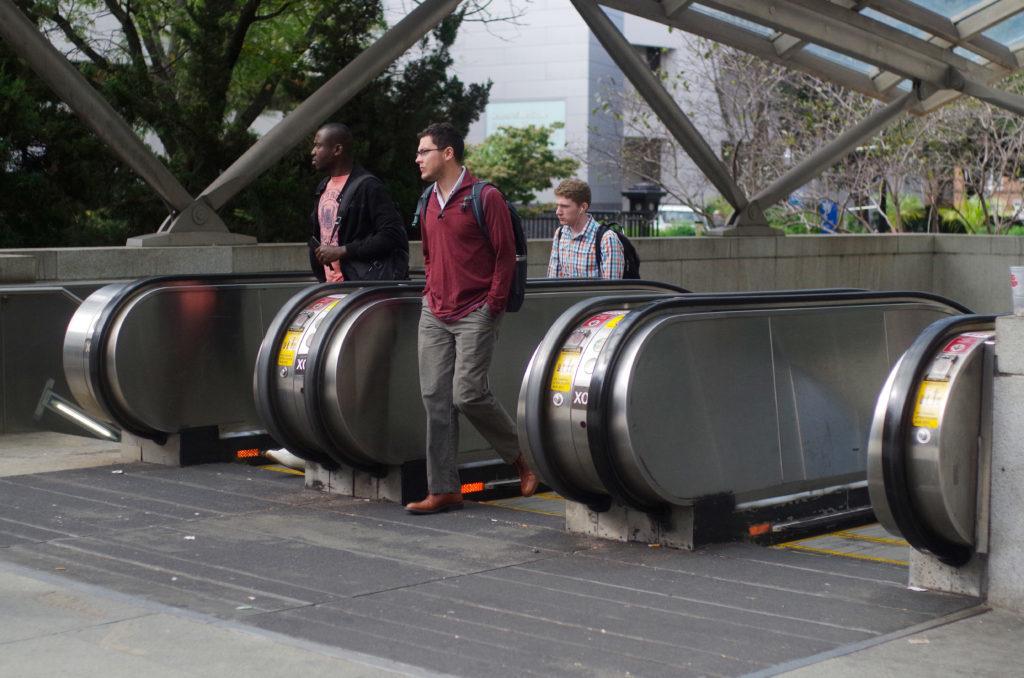Students hoping to take the Metro late at night might soon be able to ride past 11 p.m.
Mayor Muriel Bowser announced an initiative Sept. 25 to restore the Metro’s late-night hours to better fit the schedules of service industry workers who leave work far past business hours. In interviews, more than 15 students who ride the Metro said late-night hours would give them an affordable alternative to Uber and Lyft to get off campus during week nights.
Washington Metropolitan Area Transit Authority officials switched Metro operation hours in 2016 to close at 11:30 p.m. Monday through Thursday, at 1 a.m. Friday through Saturday and at 11 p.m. on Sundays. Prior to 2016, the Metro closed at midnight on weekdays and 3 a.m. on weekends.
“The time has come to return Metrorail hours to full service, and we challenge you and the Board to make restoring late-night rail service a top priority,” Bowser said in the letter, The Washington Post reported.
Spokespeople for Bowser and WMATA did not return multiple requests for comment.
Freshman Blake Sorrell said he frequently uses the Metro to visit friends in Virginia, explore downtown D.C. or go on dates in Alexandria, Virginia, with his girlfriend.
“If my friends said, ‘Hey, let’s go to Alexandria late at night,’ it’d be really helpful to get to the Metro at a later hour than 11, because that’s really early honestly,” Sorrell said.
Julia Boardman said she uses the Metro roughly three to four times a week to visit friends at other schools and attend off-campus events at night. She said the added expense of an Uber impacts her decision to go out or stay in on a weekend night.
“I go to a lot of concerts and different events and I always have to think, ‘Will I be able to Metro home?’” Boardman said.
Freshman Shwe Einthe, an international student from Thailand who can’t register for a U.S. driver’s license, said she frequents the Metro to travel anywhere farther than a 30-minute walk. Einthe said she frequently explores the city at night but forks over the money for an Uber ride if she chooses to stay out later than 11 p.m.
“It just sucks because I think most of the time as college students we tend to stay out late, and I feel like with later public transport time we can definitely explore more of the city,” Einthe said.
Senior Sarah Sem said she prefers to Metro at night because the train fare is cheaper than calling a Lyft, but she rarely rides the Metro alone after dark because she feels unsafe.
“It would definitely save money on Ubering,” Sem said. “I will say, sometimes I will Uber alone or with one person and late-night hours, as a woman, might not be exactly an addition, but if I’m with a group of people, it’ll help save money.”
She added that she prefers to travel with a group when she uses Uber of Lyft because she feels safer than she would riding the Metro.
“There are definitely disadvantages to using Uber and Lyft at night as well,” she said. “It’s kind of the lesser of all evils. But I think you can predict the environment of an Uber or Lyft more than the Metro, like assessing the situation.”
Freshman Katelyn Monostori said she takes the Metro to see her family who live in D.C., and she would benefit from late-night hours when traveling back to campus after visits.
“That would be helpful,” she said. “When I’m seeing family, we go see a play or a show or something and they normally end pretty late, so it’s always, ‘How am I going to get back?’”
Jonas Poggi, a junior who primarily takes the Metro to get to his internship on Capitol Hill, said he doesn’t think he would use the late-night hours because he doesn’t usually leave campus at night. He said he anticipates that the extended hours would help workers who work longer hours and need a ride home past 11 p.m.
“I imagine it would be a lot more helpful for other people living in the D.C. area who don’t work a 9 to 5 job like I do, like people working in service jobs that might have later hours,” Poggi said.





